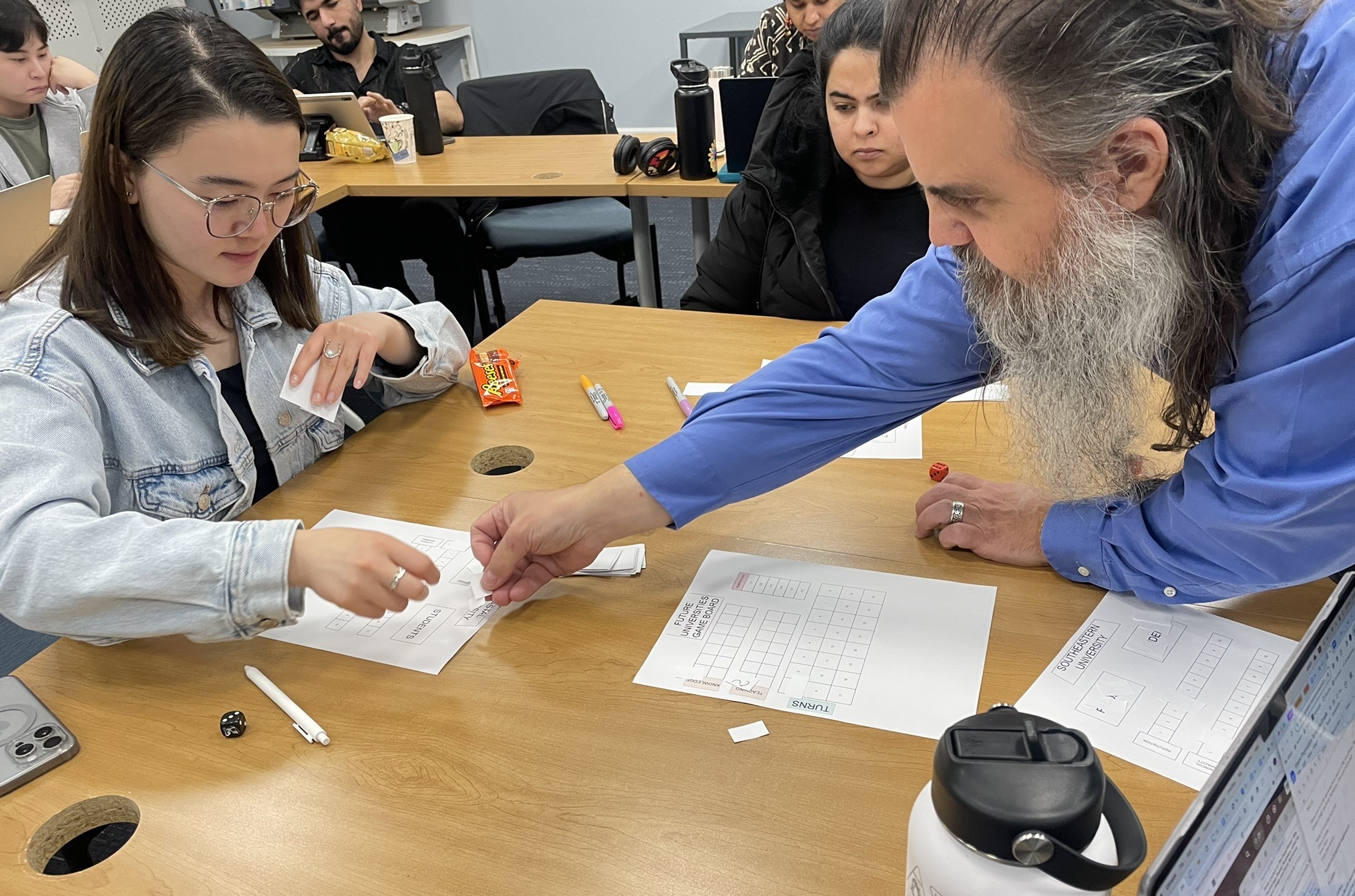Next week I’m launching my gaming in higher education seminar for Georgetown University’s Learning, Design, and Technology program. I am very excited, as ever, because it’s a great topic and one I’m eager to see my students engage. I have many plans and ideas, which are about 99% set. Here I’ll share those plans and ideas, partly for feedback, as well as to document some of my teaching practice in the open.
This is a class I’ve taught before. The idea is to introduce students to the many ways higher education can use gaming, so that they can make informed decisions about the subject in their subsequent professional lives. For example, they might go on to be part of educational design teams in academia or elsewhere.
So, the way the class works is a mix of activities. They play example games and compare notes, both in person and through writing. They discuss scholarly readings. I briefly present on each type of game. Gradually they build up a final project, either an educational game or a detailed plan for a gamified class.
A student and I trying out an early version of a tabletop game.
We begin by introducing tabletop, role playing, and computer games in order to give students a sense of the full field. (I point to sports, but don’t address them much unless students do.) Next we dive into college and university uses, emphasizing teaching. We try out educational computer, tabletop, and role playing games, as well as look into gamification. Then we focus in on design aspects, building on our experience so far and trying some challenging example games. The last month of the class branches out (heh heh) into several topics, including storytelling, AI, and a topic students collaboratively determine.
I’m doing some new stuff with the class, because I can’t resist tinkering. I’ve cut readings down a bit and made more in-class time for game design. One class is really focused on design work, plus allows room for overflow content and student reflection on where we’ve come. I’m trying to allow more time for game play, because students needed it before. The amount of technology is down a bit, because we didn’t get into each tool enough last time. I’m also reorganizing the seminar because it’s a fully hybrid/HyFlex one, with roughly one half of students online and one half remote; I’m writing a followup post on this.
I’ve also increased the climate change theme. There are more climate games and I plan on making it a more salient topic.
Here’s the syllabus. I’ve delinked some links because they pointed to restricted files.
January 14, 2025 – Introductions and into the magic circle
January 21, 2025 – Tabletop gaming
January 28, 2025 – Role Playing Games – CLASS ONLINE
February 4, 2025 – Computer Gaming
February 11, 2025 – Education and Gaming, I
***February 17: Analysis of one game due ; no class this week
Historical games, seen at the Strong National Museum of Play
February 25, 2025 – Education and Gaming, II – CLASS ONLINE
(Spring break March 4, 2025)
March 11, 2025- Gamification
March 19, 2025 – Design for gaming and education, I
***March 21 – Pitch plan for final project due
March 26, 2025 – Design for gaming and education, II
April 2, 2025 – Storytelling and games
April 9, 2025 – Design, explore, and catch up
April 16, 2025 – AI, gaming, and education
April 23, 2025 – Student selected topic:
April 30, 2025 – Final project demonstrations and presentations
***May 6 – final project due
Coming up next: redesigning this class for HyFlex.
Your email address will not be published.
Many call themselves “futurists” — Bryan actually knows how to do it.
–Howard Rheingold
Is @BryanAlexander a wizard because he wrote about the possibility of a pandemic in 2018? He says he has a beard like one.
–NPR’s 1A
“Hardest working man in edtech!”
–Jim Groom
Gotta love @BryanAlexander‘s ability to catalyze a conversation without leaning on hyperbole or triggers.
-Mark David Milliron
This is so well-structured and thoughtful that it almost made me forget I was terrified while reading it.
–Kyle Erlenbeck
When @BryanAlexander is futuring about you, you’d better start futuring yer own dang self!
–Stephanie Doscher
Your prescience is wild.
–Mike Hauge
[F]uturist and higher-ed guru Bryan Alexander…
–Gabriel Paquette


